#laparoscopicherniasurgeryinjabalpur
Explore tagged Tumblr posts
Text
All About Hernia Surgery: What You Need to Know

What is a Hernia?
A hernia occurs when an internal organ or tissue pushes through a weak spot in the muscle or surrounding tissue wall. This condition commonly affects the abdominal area but can also occur in the groin, upper thigh, and belly button. Hernias are often noticeable as a bulge and can cause discomfort or pain, especially when lifting heavy objects, coughing, or bending over.
Types of Hernias
1. Inguinal Hernia: Found in the groin area, it’s more common in men.
2. Femoral Hernia: Also in the groin but lower than an inguinal hernia, more common in women.
3. Umbilical Hernia: Occurs around the belly button.
4. Hiatal Hernia: Occurs when part of the stomach pushes through the diaphragm into the chest cavity.
5. Incisional Hernia: This can occur at the site of a previous surgical incision in the abdomen.
Symptoms of a Hernia
• A visible bulge in the affected area.
• Pain or discomfort, especially when bending over, coughing, or lifting.
• A heavy or dragging sensation in the groin.
• Weakness, pressure, or a feeling of fullness.
• In severe cases, symptoms like nausea, vomiting, and inability to move the bowels or pass gas.
Why Hernia Surgery is Necessary
While small, asymptomatic hernias may not require immediate treatment, surgery (hernia surgery in Jabalpur) is often recommended to prevent complications such as:
• Strangulation: Where the blood supply to the herniated tissue is cut off, leading to tissue death.
• Obstruction: Blocking the passage of food or stool through the intestines.
Types of Hernia Surgery
1. Open Hernia Repair (Herniorrhaphy):
• A traditional method where a surgeon (hernia surgeon in Jabalpur) makes an incision near the hernia and repairs the weakened muscle.
• Often involves the use of surgical mesh to strengthen the repair and reduce the risk of recurrence.
2. Laparoscopic Hernia Repair:
• A minimally invasive procedure (or laparoscopic hernia surgery in Jabalpur) using small incisions and a camera (laparoscope) to guide the surgery.
• Advantages include less postoperative pain, quicker recovery, and smaller scars.
Preparing for Hernia Surgery
• Medical Evaluation: Includes physical exams, imaging tests, and blood work.
• Medication Review: Discuss with your doctor any medications you're taking, as some may need to be stopped before surgery.
• Pre-surgery Instructions: Such as fasting, avoiding certain medications, and arranging for postoperative care.
The Surgical Procedure
• Anesthesia: General or local anesthesia with sedation is administered.
• Repair Process: The surgeon makes an incision (open surgery) or several small incisions (laparoscopic surgery in Jabalpur), moves the protruding tissue back into place, and repairs the weakened area with stitches or mesh.
• Closing the Incision: The incisions are closed with sutures, staples, or surgical glue.
Recovery After Hernia Surgery
• Immediate Postoperative Care: You will be monitored in the recovery room until the anesthesia wears off.
• Pain Management: Pain relief medications are prescribed to manage discomfort.
• Activity Restrictions: Avoid heavy lifting and strenuous activities for several weeks.
• Follow-Up Appointments: Necessary to monitor the healing process and remove sutures or staples if needed.
Potential Complications
• Infection at the incision site.
• Recurrence of the hernia.
• Pain or discomfort at the surgical site.
• Adverse reactions to anesthesia.
Tips for a Smooth Recovery
• Follow all post-surgery instructions provided by your surgeon.
• Maintain a healthy diet to avoid constipation and straining.
• Gradually increase physical activity as advised by your doctor.
• Keep the incision site clean and dry to prevent infection.
Hernia surgery (or hernia operation in Jabalpur) is a common and generally safe procedure that effectively addresses the discomfort and potential complications of hernias. By understanding the types of hernias, the surgical options available, and the steps for recovery, patients can approach their surgery with confidence and clarity. Always consult with a qualified healthcare professional to determine the best treatment plan for your specific condition.
#laparoscopicherniaspecialistinjabalpur#herniaoperationinjabalpur#laparoscopicherniasurgeryinjabalpur#herniasurgeryinjabalpur
0 notes
Text
Can Hernia Surgery Cause Urinary Problems?

Hernia repair is a routine surgery that is performed with the purpose of fixing the opening in the abdominal wall where some complications such as Enteroptosis may occur. Despite this, as with most forms of medication it is expected that patients may experience some symptoms of possible side effects such as the urinary system. This blog aims at discussing whether or not hernia surgery in Jabalpur results in urinary complications and if it does it will explain what they are, and how one can deal with them.
Understanding Hernia Surgery
What Is a Hernia?
Hernia refers to a situation where a soft tissue or an organ protrudes through a hole in the muscle or the muscular tissue wall. Among all the types of hernias, the most frequent one is the inguinal hernia which is situated in the groin area and more widespread among males. The signs range from a visible lump and slight swelling to extreme levels of pain.
The Surgical Procedure
Hernia surgery involves a process of correcting the position of the protruding tissue and tightening the weak region and in most cases; the surgeon has to use a mesh to improve the strength of the region. It can be done through an open procedure or laparoscopic hernia surgery in Jabalpur procedure depending on the expectation of having a permanent cure and to minimize the chances of the condition reoccurring.
Potential Urinary Problems after Hernia Surgery:
Urinary Retention
One of the most common urinary problems after hernia operation in Jabalpur is urinary retention, where the patient is unable to empty the bladder completely. This condition can result from several factors:
Anesthesia: The use of anesthesia during surgery can temporarily affect bladder function.
Pain Medications: Postoperative pain medications, especially opioids, can also contribute to urinary retention.
Swelling and Inflammation: The surgical area may swell, impacting nearby organs, including the bladder and urethra.
Dysuria (Painful Urination)
Some patients may experience dysuria, or painful urination, following hernia surgery. This can be due to:
Catheter Use: The insertion of a urinary catheter during hernia surgery in Jabalpur can cause temporary irritation or infection.
Post-Surgical Inflammation: Inflammation from the surgical site may exert pressure on the urinary tract, leading to discomfort.
Managing Urinary Problems Post-Surgery
Immediate Postoperative Care
Bladder Monitoring: Nurses and medical staff will monitor bladder function closely immediately after surgery to ensure that the patient can urinate properly.
Medication Adjustments: Adjusting pain medications can help reduce the risk of urinary retention.
Home Care and Follow-Up
Hydration: Staying well-hydrated helps maintain urinary tract health and promotes regular urination.
Bladder Training: Some patients might benefit from bladder training exercises to restore normal function.
Medical Advice: If urinary problems persist, it is crucial to consult with a healthcare provider. They may recommend further evaluation or treatments such as alpha-blockers, which can help relax the muscles of the urinary tract.
When to Seek Medical Attention
While some urinary issues are temporary and resolve on their own, it’s important to seek medical attention if you experience:
Severe Pain: Intense pain during urination or an inability to urinate should be addressed immediately.
Signs of Infection: Symptoms such as fever, chills, or cloudy and foul-smelling urine could indicate a urinary tract infection (UTI).
Persistent Symptoms: If urinary problems continue beyond a few days post-surgery, a follow-up with your healthcare provider is necessary to rule out any complications.
Incontinence or acute renal failure may be accompanied by urinary retention or painful micturition after hernia operations. However, these problems are usually amenable and thus usually decrease as the body recovers from surgery. One should always ensure that they get to read and be more of a pro when it comes to postoperative operations. It is always important to inform your hernia surgeon in Jabalpur of any issue you are experiencing so that you can receive the right care at the right time.
Information on this area can help a patient who is about to undergo laparoscopic hernia surgery in Jabalpur to have an understanding of what to expect in terms of urinary tract complications and how they can be handled. In conclusion, this blog has highlighted some of the urinary complications that may occur in hernia surgery patients and the measures that can be taken to manage them for superior patient care.
#laparoscopicherniaspecialistinjabalpur#herniaoperationinjabalpur#laparoscopicherniasurgeryinjabalpur#herniasurgeryinjabalpur#herniasurgeoninjabalpur
0 notes
Text
Why Do Hernias Happen After Surgery?

A hernia is the occurrence of an organ or tissue protruding through a hole or weak area in the muscle or the tissue wall. This may be as a result of laparoscopic hernia surgery in Jabalpur which is referred to as a postoperative or incisional hernia. This knowledge will help in identifying the causes of hernias, especially after surgeries, and how they could be prevented or controlled.
What Causes Postoperative Hernias?
1. Weakness at the Surgical Site:
This is because after surgery the tissues at the site of the incision are inherently weaker than the other tissues in the body. Suturing also means that there is scarring and the new tissue is relatively weaker due to the scarring process. This weak spot can lead to a hernia particularly if there is pressure or strain in that region.
2. Infection at the Surgery Site:
When an infection develops in the site where hernia surgery in Jabalpur was carried out, the rate of tissue repair is affected. This is because the tissues break down and become irritable and weak due to the infection, and hence facilitate the formation of a hernia in that area.
3. Excessive Strain and Pressure:
Activities that increase pressure inside your abdomen, like heavy lifting, coughing a lot, or straining during bowel movements, can put stress on the surgical site. This can cause the weak area to give way, leading to a hernia.
4. Obesity:
Carrying extra weight puts constant pressure on your abdominal wall, including the surgical site. This pressure can strain the incision area and make it more likely for a hernia to form.
5. Poor Nutrition and Lifestyle Factors:
Good nutrition is essential for healing. Lack of important nutrients can slow down the healing process and weaken tissues. Smoking also negatively affects wound healing, increasing the risk of a hernia.
6. Preexisting Health Conditions:
Conditions like chronic obstructive pulmonary disease (COPD), diabetes, and connective tissue disorders can interfere with proper healing. These conditions can make the tissues weaker and more prone to hernias.
7. Surgical Technique:
The way hernia operation in Jabalpur is performed can affect hernia risk. Minimally invasive surgeries, like laparoscopic hernia surgery in Jabalpur procedures, usually have a lower risk of hernias compared to open surgeries. However, any surgical approach can lead to hernias if complications occur or if the incision site is under a lot of tension.
How to Prevent Postoperative Hernias
While it’s not always possible to completely prevent hernias after surgery, these steps can help reduce the risk:
• Follow Post-Surgery Instructions: Carefully follow your hernia surgeon in Jabalpur’s advice on activities, wound care, and follow-up visits.
• Maintain a Healthy Weight: Aim for a healthy weight with a balanced diet and regular exercise.
• Avoid Strain: Don’t lift heavy objects or do activities that increase abdominal pressure until you’re fully healed.
• Eat Well: Ensure your diet includes all the necessary nutrients to support healing. Your doctor might suggest supplements.
• Control Chronic Conditions: Manage any chronic health issues with proper medical care to aid in better healing.
Hernias after hernia surgery in Jabalpur are common and can happen for several reasons, including weakness at the surgical site, infections, excessive strain, obesity, poor nutrition, preexisting health conditions, and surgical technique. Knowing these causes can help you take steps to prevent hernias and ensure a smooth recovery. If you suspect you have a hernia after surgery, contact the best hernia surgeon in Jabalpur right away to get the appropriate treatment and prevent further issues.
#laparoscopicherniaspecialistinjabalpur#laparoscopicsurgeryinjabalpur#herniaoperationinjabalpur#laparoscopicherniasurgeryinjabalpur#bestherniasurgeoninjabalpur#herniasurgeryinjabalpur
0 notes
Text
Can Hernia Surgery Cause Blood Clots?
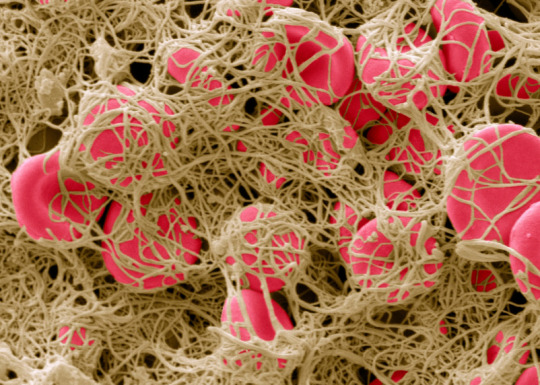
Hernia surgery is a common procedure aimed at repairing weaknesses in the abdominal wall where organs or tissues protrude. While generally safe and effective, it is essential to be aware of potential complications, one of which is the risk of blood clots. This blog delves into how hernia surgery in Jabalpur can lead to blood clots, which is at risk, and what measures can be taken to prevent this complication.
Understanding Blood Clots
Blood clots, or deep vein thrombosis (DVT), occur when blood thickens and clumps together, usually in the deep veins of the legs. These clots can be dangerous if they travel to the lungs, causing a pulmonary embolism (PE). Surgery, including hernia repair, can increase the risk of DVT due to several factors, such as reduced mobility and the body's natural response to injury.
Why Hernia Surgery Might Lead to Blood Clots
1. Immobility During and After Surgery: Patients undergoing laparoscopic hernia surgery in Jabalpur are typically immobile for a period, which can slow blood flow and increase the likelihood of clot formation.
2. Surgical Trauma: Surgery causes tissue damage and inflammation, prompting the body to initiate healing processes that include clot formation to stop bleeding. This can inadvertently lead to excessive clotting.
3. Anesthesia Effects: General anesthesia used during hernia operation in jabalpur can cause blood vessels to dilate and blood pressure to drop, which may contribute to blood pooling in the veins.
4. Postoperative Recovery: Limited movement during recovery can further contribute to the risk of DVT as muscle contractions help maintain healthy blood flow.
Who is at Risk?
Certain factors can increase the risk of developing blood clots after hernia surgery in Jabalpur:
• Age: Older adults have a higher risk.
• Obesity: Excess weight can put additional pressure on veins.
• Previous DVT or PE: History of blood clots increases the likelihood of recurrence.
• Genetic Clotting Disorders: Conditions like Factor V Leiden mutation.
• Prolonged Immobility: Long periods of inactivity before or after surgery.
• Other Health Conditions: Such as heart disease, cancer, or varicose veins.
Preventive Measures:
1. Medication: Doctors may prescribe anticoagulants (blood thinners) to prevent clot formation.
2. Compression Devices: Using compression stockings or pneumatic compression devices can help maintain blood flow in the legs.
3. Early Mobilization: Encouraging movement soon after surgery can reduce the risk of clot formation.
4. Hydration: Staying well-hydrated helps maintain blood viscosity and flow.
5. Leg Exercises: Simple exercises like ankle pumps and leg lifts can stimulate circulation done as per the best hernia surgeon in Jabalpur prescription.
Recognizing Symptoms:
It’s crucial to recognize the signs of DVT and PE:
• DVT Symptoms: Swelling, pain, and tenderness in one leg, often in the calf. Skin may feel warm and look red.
• PE Symptoms: Sudden shortness of breath, chest pain that worsens with deep breaths, rapid heart rate, and coughing up blood.
While hernia surgery can potentially lead to blood clots, understanding the risk factors and taking preventive measures can significantly reduce this risk. Patients should discuss their individual risk factors with their hernia surgeon in Jabalpur and follow postoperative care instructions meticulously. Promptly addressing any symptoms of DVT or PE is vital for a safe recovery. By being proactive and informed, patients can navigate their hernia surgery with confidence and minimized risk.
#laparoscopicherniaspecialistinjabalpur#herniaoperationinjabalpur#laparoscopicherniasurgeryinjabalpur#bestherniasurgeoninjabalpur
0 notes
Text
Can Hernia Surgery Cause Prostate Problems?

Hernia surgery is a common procedure, but many people worry about potential complications, particularly whether it can cause prostate problems. Understanding the relationship between hernia surgery in Jabalpur and prostate health requires a look at the anatomy and the nature of the surgeries involved.
Understanding Hernias and Prostate Health:
A hernia occurs when an internal part of the body pushes through a weakness in the muscle or surrounding tissue wall. Common types include inguinal (groin) hernias, which are most relevant when discussing proximity to the prostate.
The prostate is a small gland located just below the bladder in men and surrounds part of the urethra. It plays a crucial role in male reproductive health by producing seminal fluid. Because of its location, there is concern that procedures in the nearby inguinal region might affect it.
The Nature of Hernia Surgery:
Hernia repair, especially inguinal hernia repair, involves returning the displaced tissue to its proper position and reinforcing the muscle wall, often with mesh. There are two main types of hernia surgery:
1. Open Surgery: A single incision is made near the hernia site.
2. Laparoscopic hernia surgery in Jabalpur: Several small incisions are made for a camera and surgical instruments.
Both methods aim to minimize trauma to surrounding tissues, but the proximity of the inguinal area to the prostate raises valid concerns.
Potential Risks and Complications:
While hernia surgery in Jabalpur is generally safe, potential complications can arise, though prostate problems are not typically among them. Possible complications include:
• Infection: Post-operative infections can occur but are generally related to the surgical site rather than the prostate.
• Nerve Damage: This can cause pain or numbness in the groin area, but it usually doesn’t affect the prostate directly.
• Bladder and Urinary Issues: Rarely, patients might experience urinary retention or difficulty, which can be mistaken for prostate problems. However, these are typically short-term and resolve with time.
Prostate Problems and Hernia Surgery:
There is no direct evidence that hernia surgery in Jabalpur causes prostate problems. However, certain symptoms can overlap or be mistaken for each other. For instance, urinary difficulties post-surgery might be confused with prostate issues.
Pre-existing Conditions: Men with pre-existing prostate conditions, such as benign prostatic hyperplasia (BPH), might notice increased symptoms post-surgery due to the stress of surgery and recovery. This is not because the surgery caused prostate issues but because the body is dealing with multiple stresses simultaneously.
Mitigating Risks:
To minimize potential complications:
• Discuss Thoroughly: Patients should discuss their full medical history with their surgeon, including any prostate issues.
• Choose Experienced Surgeons: Opt for a hernia surgeon in Jabalpur with extensive experience in hernia repair.
• Follow Post-Op Care: Adhere strictly to post-operative care instructions to avoid complications.
While hernia operation in Jabalpur, especially inguinal hernia repair, is close to the prostate, there is no direct evidence linking it to causing prostate problems. The symptoms that might arise post-surgery are usually temporary and related to the body's overall response to surgery rather than the prostate itself. As always, discussing concerns with the best hernia surgeon in Jabalpur provider is crucial for personalized advice and peace of mind.
#laparoscopicherniaspecialistinjabalpur#herniaoperationinjabalpur#bestherniasurgeoninjabalpur#laparoscopicherniasurgeryinjabalpur
0 notes
Text
Understanding When Hernia Surgery is Necessary?

Let's talk about hernias in easy words. An organ or fatty tissue pushing through a weak point in the surrounding muscle or tissue results in a hernia. This can make a lump or bulge, and sometimes it hurts. Most hernias can be managed without hernia surgery in Jabalpur, but sometimes surgery is needed to fix them. Here, we'll talk about when that might be necessary.
What's a Hernia?
Imagine your body like a house with walls made of muscles. Sometimes, a part of your insides can poke through a hole or weak spot in those walls. That's a hernia. It's like when a ball pops through a hole in a net.
When Is Surgery Needed?
1. Pain That Won't Go Away: If a hernia causes pain that doesn't stop, surgery might be needed to fix it and make you feel better.
2. Risk of Getting Stuck: Sometimes, a hernia can get trapped and can't go back inside. This is serious because it can cut off blood flow and hurt your insides. Surgery can help prevent this.
3. Looks: Even though it's not always necessary for health reasons, some people may want surgery to fix a hernia that shows up as a lump or bulge because they don't like how it looks.
What Happens During Surgery?
Laparoscopic hernia surgery in Jabalpur is like fixing a tear in a piece of clothing. The doctor will make a small cut near the hernia and then sew the hole shut or use a special patch to cover it up. They might do this by making a bigger cut or using a tiny camera to see the inside and fix it with special tools. Sometimes a robot helps the doctor do the surgery, too.
After Surgery:
Your body requires time to heal after surgery. It's common to feel swollen or sore, though. It hurts for a while, just as when you scrape your knee. Until the best hernia surgeon in Jabalpur gives the all-clear, you'll need to take it easy and refrain from moving heavy objects. They'll follow up with you to make sure your recuperation is going smoothly.
Hernias can be uncomfortable, but most of the time, they don't need surgery. However, if a hernia causes a lot of pain, gets stuck, or bothers you because of how it looks, surgery might be the best way to fix it. Hernia surgery in Jabalpur helps to sew up the hole or weak spot in the muscle and makes sure everything stays where it should be. After surgery, your body needs time to heal, but soon enough, you'll be feeling better and back to your normal self.
#laparoscopicherniaspecialistinjabalpur#herniaoperationinjabalpur#herniasurgeoninjabalpur#laparoscopicherniasurgeryinjabalpur#herniasurgeryinjabalpur
0 notes
Text
Choosing the Right Hernia Surgeon: A Vital Decision for Your Health
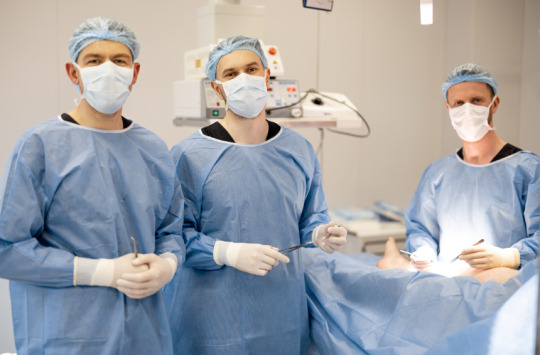
A hernia diagnosis, though overwhelming, can still be managed with the help of the right surgeon who can make the journey bearable and confident through it all. From inguinal to umbilical, or any other type of this condition, find and visit only the best specialists in hernia surgery to make sure you will have a good recovery. This article will look into the things you need to take into account while discovering the right one for your situation to be sure that you have a hernia surgeon in Jabalpur with a high-quality service ranging from diagnosis to postoperative recovery.
The Importance of Selecting the Best Hernia Surgeon
Hernia surgery in Jabalpur is a hernia medical procedure needing both expertise and superior accuracy. The most important factor to be considered by you in the choice of a hernia surgeon will be your treatment experience. Here's why:
1. Expertise Saves Lives: Hernia operation in Jabalpur requires cutting-edge technology and the ability of the surgeon. The proficiency of the experienced hernia surgeon enables him or her to conduct some difficult procedures with decent accuracy, thus minimizing the probability of negative matters and bringing a faster recovery process after surgery.
2. Personalized Care: All patients are different and an experienced hernia surgeon knows the significance of careful tailoring of a surgical plan. They add a personal touch by knowing you best of all that they know about your personal needs, favorite colors, and medical background to come up with a unique treatment plan with the highest success rate.
3. Advanced Techniques: With the constant evolution of hernia surgeries nurturing new methods and technologies to enhance patient outcomes, the field is growing fast. A top-notch hernia surgeon is always up-to-date with the latest advancements in the field as well as well-versed with minimally invasive procedure options such as laparoscopic and robotic surgeries that promote speedier recovery times and lessened scarring.
4. Compassionate Support: It is natural to feel anxious when you have surgery scheduled, but the compassionate surgeon will accompany you through the process upholding his professionalism. The best hernia surgeon in Jabalpur takes time to explain the procedure in detail, and answer your concerns and fears; thereby, ensuring you the correct treatment while ensuring that you are informed, empowered, and reassured.
Choosing the Best Hernia Surgeon: Key Considerations
When selecting a hernia surgeon, consider the following factors to make an informed decision:
1. Credentials and Experience: Look for a surgeon who is board-certified in laparoscopic hernia surgery in Jabalpur and has extensive experience performing hernia repairs. Review their credentials, including their education, training, and track record of success.
2. Patient Reviews and Testimonials: Reading reviews and testimonials from previous patients can offer valuable insights into the surgeon's bedside manner, skill level, and overall patient satisfaction. Pay attention to feedback regarding communication, professionalism, and outcomes.
3. Consultation Experience: Schedule consultations with potential hernia surgeons to discuss your condition, treatment options, and any concerns you may have. Pay attention to how well the surgeon listens to your needs, explains the procedure, and addresses your questions.
4. Hospital Affiliation: Consider the hospital or medical center where the surgeon practices. Choose a facility with a reputation for excellence in surgical care, state-of-the-art equipment, and comprehensive support services.
5. Gut Instinct: Trust your instincts when selecting a hernia surgeon. Choose someone who inspires confidence, instills trust, and demonstrates genuine care and compassion for your well-being.
Finding the best hernia surgeon in Jabalpur is a critical decision that can significantly impact your health and quality of life. By considering factors such as expertise, experience, patient-centered care, and personal rapport, you can select a surgeon who meets your unique needs and ensures the best possible outcome. Remember, your health is worth investing in, so take the time to choose wisely and embark on your hernia treatment journey with confidence and optimism.
#laparoscopicherniaspecialistinjabalpur#herniaoperationinjabalpur#herniasurgeryinjabalpur#bestherniasurgeoninjabalpur#herniasurgeoninjabalpur#laparoscopicherniasurgeryinjabalpur
0 notes
Text
Understanding the Risks and Complications of Hernia Surgery
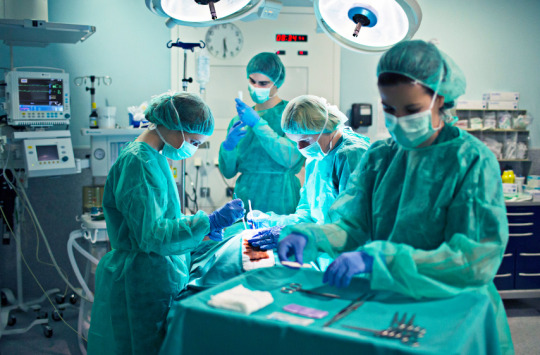
Hernia surgery is a common and generally safe procedure, but like any surgery, it comes with its set of risks and potential complications. It's essential for individuals considering or scheduled for hernia surgery to be informed about these aspects. Let's delve into the possible risks associated with hernia surgery in Jabalpur and how healthcare professionals work to mitigate them.
Understanding Hernia Surgery
Before exploring the risks, let's briefly understand what hernia surgery involves. Hernias occur when an organ or fatty tissue protrudes through a weak spot in the surrounding muscle or connective tissue. Laparoscopic hernia surgery in Jabalpur is often recommended to repair the weakened area and alleviate symptoms.
Common Risks of Hernia Surgery:
1. Infection:
Infections can occur post-surgery. Hernia surgeon in Jabalpur takes extensive precautions to maintain a sterile environment during the procedure, but infections remain a risk.
2. Bleeding:
While uncommon, excessive bleeding can occur during or after surgery. Surgeons are trained to manage bleeding, and patients are closely monitored to detect any signs of abnormal bleeding.
3. Pain and Discomfort:
Pain is a common postoperative experience, but in some cases, individuals may experience prolonged or severe discomfort. Pain management strategies are usually discussed and implemented to ensure patient well-being.
4. Recurrence of Hernia:
Despite a successful surgery, there is a small chance of hernia recurrence. This risk varies depending on the type of hernia and the surgical technique used.
5. Nerve Damage:
Surgical procedures involve navigating delicate structures, and there is a risk of nerve damage. This may lead to numbness, tingling, or, in rare cases, chronic pain.
6. Adverse Reactions to Anesthesia:
Anesthesia carries its own set of risks, including allergic reactions or adverse effects. However, these are relatively rare, and anesthesiologists take precautions to minimize such occurrences.
Mitigating Risks:
Healthcare professionals prioritize patient safety, employing various strategies to mitigate the risks associated with hernia surgery:
1. Thorough Preoperative Assessment:
Comprehensive preoperative assessments help identify any factors that might increase the risk of complications. This includes evaluating the patient's overall health, medical history, and lifestyle factors.
2. Skilled Surgical Technique:
Surgeons use advanced techniques to minimize trauma during surgery, reducing the risk of complications. Minimally invasive procedures, such as laparoscopic surgery, are increasingly popular for their potential to lower risks and accelerate recovery.
3. Postoperative Monitoring and Care:
Close postoperative monitoring is crucial. Healthcare providers keep a vigilant eye on patients during the recovery period to promptly identify and address any potential issues.
While hernia operation in Jabalpur involves risks, it is crucial to recognize that these are often outweighed by the benefits of resolving the hernia and alleviating associated symptoms. Patients are encouraged to engage in open communication with their healthcare providers, discuss any concerns, and actively participate in preoperative and postoperative care plans.
Ultimately, being well-informed about the risks and complications allows individuals to approach hernia surgery with a realistic understanding, empowering them to make informed decisions about their health and well-being. Always consult with the best hernia surgeon in Jabalpur for personalized advice based on your specific medical situation.
#laparoscopicsurgeryinjabalpur#laparoscopicherniasurgeryinjabalpur#herniasurgeoninjabalpur#herniasurgeryinjabalpur#herniaoperationinjabalpur
0 notes
Text
#laparoscopicherniaspecialistinjabalpur#gallbladdersurgeryinjabalpur#laparoscopicherniasurgeryinjabalpur#laparoscopicsurgeoninjabalpur
0 notes
Text
Laparoscopic Surgery: A Revolutionary Approach to Minimally Invasive Healthcare

Laparoscopic surgery, commonly known as minimally invasive surgery, represents a paradigm shift in the world of healthcare. This innovative surgical technique has not only transformed patient experiences but also expanded the scope of medical possibilities. In this article, we'll explore what laparoscopic surgery entails and the compelling reasons that drive its widespread adoption.
Understanding Laparoscopic Surgery:
Laparoscopic surgery in jabalpur is a cutting-edge medical procedure that enables surgeons to perform intricate operations with minimal invasiveness. It relies on specialized instruments and a laparoscope, a tiny camera, to provide a magnified view of the internal organs. Real-time images captured by the camera are displayed on a monitor, guiding the surgeon through the procedure.
The Causes Behind the Rise of Laparoscopic Surgery:
Minimized Trauma: Laparoscopic surgery excels in minimizing the trauma to the patient's body. Instead of large, invasive incisions, it involves tiny keyhole openings, leading to reduced tissue damage and a gentler surgical experience.
Accelerated Recovery: Smaller incisions translate to swifter recovery times. Patients undergoing laparoscopic hernia surgery in jabalpur procedures generally experience less post-operative pain and discomfort, allowing them to resume their daily routines sooner.
Enhanced Safety: The reduced risk of complications, such as infections and bleeding, makes laparoscopic and GERD surgery in jabalpur a safer choice for patients. This is particularly significant for individuals with underlying health conditions.
Precision and Accuracy: The laparoscope's high-definition imagery enhances a surgeon's precision, facilitating intricate procedures with greater accuracy. This improved visualization contributes to better patient outcomes.
Shorter Hospital Stays: Laparoscopic surgery often necessitates shorter hospital stays compared to traditional open surgeries. This not only reduces healthcare costs but also minimizes the disruption to patients' lives.
Versatility: Laparoscopic techniques find applications across a spectrum of best laparoscopic surgeons in jabalpur or medical specialties, including gynecology, gastroenterology, urology, and orthopedics. From gallbladder removal to cancer surgeries, its versatility benefits patients with a wide array of conditions.
Cosmetic Benefits: Smaller incisions result in less conspicuous scars, offering cosmetic advantages to patients who value the aesthetics of their post-surgical appearance.
Conclusion:
Laparoscopic surgery represents a monumental leap in the field of healthcare. Its minimally invasive nature, coupled with the numerous advantages it offers, has made it the preferred choice for both patients and medical professionals. As technology continues to evolve, laparoscopic procedures are likely to become even more refined and accessible, promising improved healthcare outcomes and enhanced patient well-being in the years to come.
#gallbladdersurgeryinjabalpur#herniasurgeoninjabalpur#gallbladderstonesurgeryinjabalpur#laparoscopicsurgeoninjabalpur#laparoscopicsurgeryinjabalpur#laparoscopicherniasurgeryinjabalpur#herniasurgeryinjabalpur
0 notes
Text
https://www.drdigantpathak.in/sex-after-hernia-surgery-when/

Sex is a natural act and a necessity of every human being. Since almost all the hernias are present on the front side of body one can think that hernia might interfere with sex. Hernia, whether it is below the thigh or near the navel or the incisional hernia of the old operation site —– makes little bit of trouble in the process of sex
https://www.drdigantpathak.in/wp-content/uploads/2021/11/SEX.jpg
WHEN CAN I HAVE SEX ?
When can I have sex after hernia surgery, how can I do it, can hernia recur because of physical efforts done during sex —- Many such questions come in the mind of the patients but due to hesitation they are not able to ask the doctor.
To have sex after any surgery, first of all it is necessary that the patient listen to his/ her body—- when he/ she himself/ herself feels comfortable only then is the right time for sex
You may be uncomfortable due to pain for some time after surgery —- that time is not right. You are mentally unprepared for sex due to physical fatigue and pain after surgery. This is natural. After some time your pain subsides and you feel physically relaxed too. You can have sex at this time
RELATION WITH TYPE OF HERNIA SURGERY
It is generally seen that after laparoscopic surgery, the pain is very less and the recovery of the patient is faster. Patients recover more quickly after laparoscopic surgery, so sex can be quicker and more comfortable than with open incision surgery.
https://www.drdigantpathak.in/wp-content/uploads/2021/11/MOOD.jpg
If the patient feels pain while having sex, then it should be stopped in between and the next day appointment with the doctor should be made.
https://www.drdigantpathak.in/wp-content/uploads/2021/11/DISCUSS.jpg
FEW GENERAL TIPS
Here are few general tips :
Take your own time and do not be in hurry
Be slow and be gentle
Choose position comfortable to you
Stop immediately if pain or discomfort increases
#bestherniasurgeoninjabalpur#herniaoperationinjabalpur#laparoscopicherniasurgeryinjabalpur#laparoscopicsurgeryinjabalpur#bestlaparoscopicsurgeoninjabalpur
0 notes
Text
Post-Hernia Surgery Precautions: Ensuring a Smooth Recovery

Hernia surgery in Jabalpur is a common procedure aimed at repairing a weakened area in the abdominal wall where tissue or organs may protrude. While advancements in medical technology have made the hernia operation in jabalpur safer and more effective, the key to a successful recovery lies in following the right precautions. Here's a comprehensive guide to post-hernia surgery precautions that can help ensure a smooth and uncomplicated healing process.
1. Follow Your Surgeon's Instructions: Your hernia surgeon in jabalpur will provide detailed post-operative instructions tailored to your specific situation. Adhere to these guidelines meticulously to facilitate a successful recovery.
2. Rest and Allow Healing: Adequate rest is vital during the initial days after laparoscopic surgery in jabalpur. Avoid strenuous activities, lifting heavy objects, or vigorous exercises until your surgeon gives the green light.
3. Manage Pain Properly: Pain and discomfort are normal after laparoscopic hernia surgery in jabalpur. Take prescribed pain medications as directed by your doctor to stay comfortable and prevent unnecessary strain on the surgical site.
4. Maintain Good Hygiene: To avoid infection, keep the surgery area dry and clean. Observe the instructions for wound care and bathing provided by your laparoscopic surgeon in jabalpur.
5. Watch for Infection Signs: Look out for infection-related symptoms such a rash, swelling, warmth, or discharge coming from the incision site. Contact your doctor right away if you experience any of these symptoms.
6. Eat a Balanced Diet: Nutrition plays a crucial role in recovery. Consume a diet rich in vitamins, minerals, and protein to support tissue healing and boost your immune system.
7. Stay Hydrated: Drink plenty of fluids to promote healing and prevent constipation, which can strain the surgical site.
8. Gradually Resume Physical Activities: Consult your doctor before resuming physical activities or exercises. Start with light walking and gradually increase intensity as advised.
9. Avoid Straining: Refrain from activities that cause strain on the abdomen, such as heavy lifting, coughing forcefully, or pushing heavy objects.
10. Wear Comfortable Clothing: Choose loose-fitting clothing that won't rub against the surgical site, promoting comfort and preventing irritation.
11. Support the Surgical Site: Some individuals find using a pillow or a cushion to support the abdomen when coughing, sneezing, or laughing provides relief.
12. Monitor Bowel Movements: Constipation can strain the surgical area. If you experience difficulties, discuss safe ways to manage this with your doctor.
13. Attend Follow-up Appointments: Regularly scheduled follow-up appointments allow your surgeon to monitor your progress, address any concerns, and adjust your recovery plan if necessary.
14. Listen to Your Body: Pay attention to the signals coming from your body. Please get medical attention if you have any unexpected pain, swelling, fever, or other symptoms.
Hernia surgery can mark the beginning of your path towards a healthier, more comfortable life. By adhering to these post-operative precautions, you're taking proactive steps to ensure a successful recovery, minimize complications, and regain your normal daily activities sooner. Always consult your best hernia surgeon in Jabalpur for personalized advice and guidance throughout your healing journey.
#bestherniasurgeoninjabalpur#herniasurgery#laparoscopicherniaspecialistinjabalpur#herniasurgeryinjabalpur#herniaoperationinjabalpur#laparoscopicsurgeryinjabalpur#laparoscopicherniasurgeryinjabalpur#herniasurgeoninjabalpur
0 notes
Text
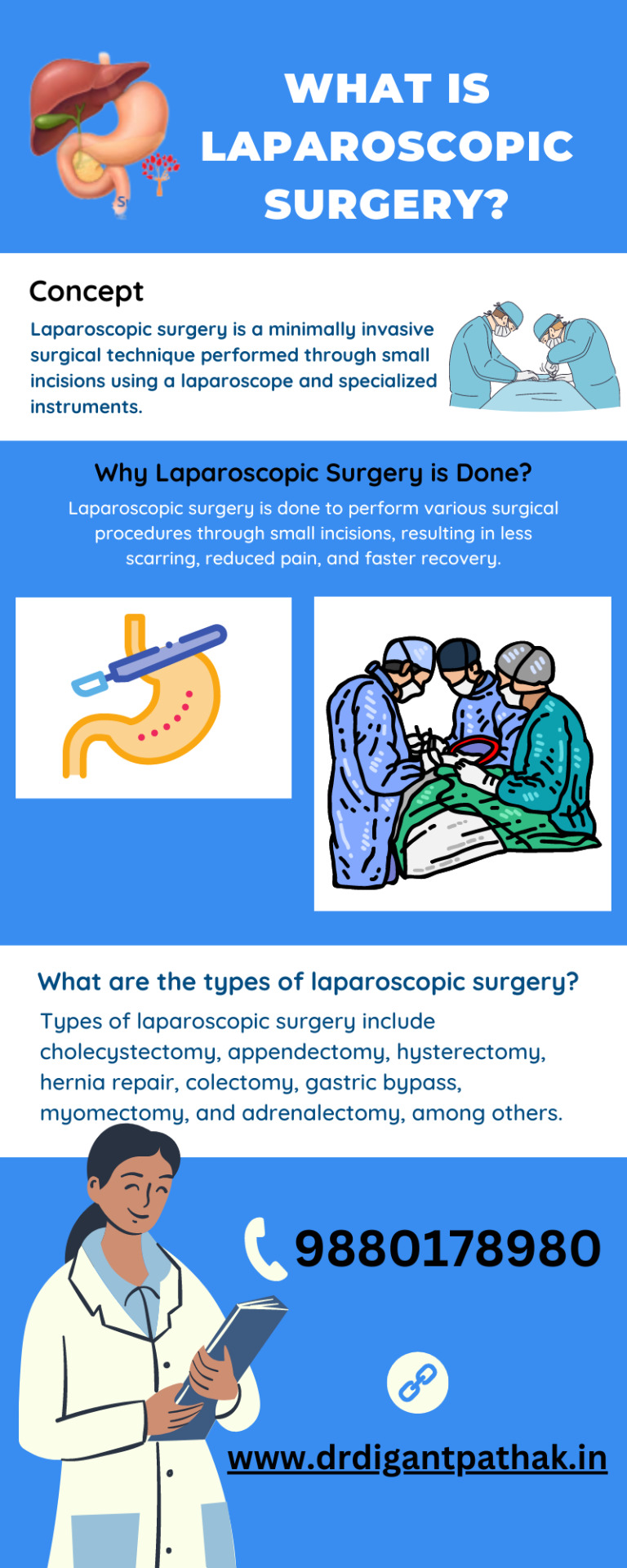
Laparoscopic Surgery: A Minimally Invasive Approach for Various Medical Conditions
Laparoscopic surgery, also known as minimally invasive surgery or keyhole surgery, is a surgical technique that involves performing procedures through small incisions using a laparoscope and specialized instruments. The laparoscope is a thin, flexible tube equipped with a camera and light, allowing the laparoscopic surgeon in jabalpur to visualize the internal organs and tissues on a monitor in real-time. The instruments are inserted through other small incisions to perform the surgery with precision.
Causes for Laparoscopic Surgery: Laparoscopic surgery in jabalpur is used for various medical conditions, including:
Gallbladder disease: Gallbladder surgery in jabalpur for gallstone-related issues.
Appendicitis: Laparoscopic appendectomy for the removal of the inflamed appendix.
Gynecological conditions: Laparoscopic hysterectomy, myomectomy, and ovarian cystectomy.
Hernia repair: Hernia surgery in jabalpur for inguinal, umbilical, and incisional hernias.
Types of Laparoscopic Surgery: The types of laparoscopic surgery are numerous and span across various medical specialties. Some common types include:
Cholecystectomy: Removal of the gallbladder.
Appendectomy: Removal of the appendix.
Hysterectomy: Removal of the uterus.
Colectomy: Removal of part of the colon.
Gastric Bypass: Weight loss surgery for obesity.
Laparoscopic surgery offers advantages such as reduced scarring, faster recovery, and shorter hospital stays, making it a preferred choice for many surgical procedures. However, the suitability of laparoscopic surgery for a specific medical condition is determined by the hernia surgeon in jabalpur based on the patient's individual circumstances.
#laparoscopicherniaspecialistinjabalpur#laparoscopicsurgeryinjabalpur#laparoscopicherniasurgeryinjabalpur#gallbladdersurgeryinjabalpur#gallbladdersurgeonsinjabalpur
0 notes
Text
#laparoscopicsurgeryinjabalpur#laparoscopicherniasurgeryinjabalpur#gallbladdersurgeoninjabalpur#bestherniasurgeoninjabalpur
0 notes
Text

#laparoscopicherniasurgeryinjabalpur#herniasurgeoninjabalpur#herniasurgery#bestherniasurgeoninjabalpur
0 notes
Text
Types of Laparoscopic Surgery: A Comprehensive Overview
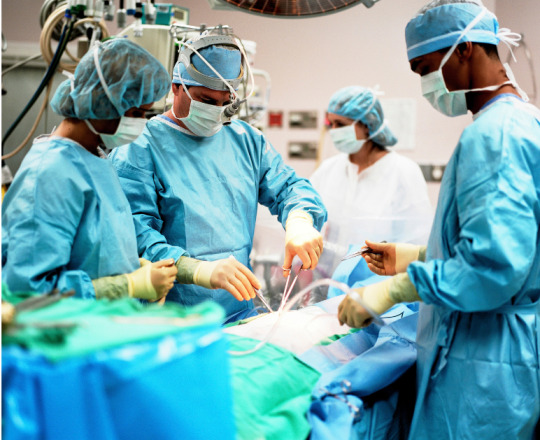
Laparoscopic surgery, also known as minimally invasive surgery, has revolutionized the field of medicine by offering numerous advantages over traditional open surgery. This surgical approach involves making small incisions and using a laparoscope (a thin, lighted tube with a camera) to visualize and operate on internal organs. The use of laparoscopy has expanded across various medical specialties due to its benefits, including reduced scarring, shorter recovery times, and decreased post-operative pain. In this article, we will explore the most common types of laparoscopic surgery in jabalpur performed in modern medicine.
Laparoscopic Cholecystectomy: One of the most prevalent laparoscopic procedures is the removal of the gallbladder, known as laparoscopic cholecystectomy(gallbladder stone surgery in jabalpur). This surgery is typically conducted to treat gallstones or other gallbladder-related issues. During the procedure, the gallbladder surgeon in jabalpur makes small incisions in the abdomen, inserts the laparoscope and other surgical instruments, and carefully removes the gallbladder.
Laparoscopic Appendectomy: An appendectomy is the surgical removal of the appendix, and the laparoscopic approach is now widely used for this procedure. By making a few small incisions, the laparoscopic surgeon in jabalpur can extract the inflamed or infected appendix, usually to treat acute appendicitis.
Laparoscopic Hernia Repair: Laparoscopic surgery is also employed to repair hernias, including inguinal, umbilical, and ventral hernias. The laparoscopic hernia surgery in jabalpur technique involves placing a mesh over the weakened area to reinforce the abdominal wall and prevent the hernia from recurring.
Laparoscopic Hysterectomy: In cases where a woman's uterus needs removal, a laparoscopic hysterectomy offers a minimally invasive alternative. The best laparoscopic surgeon in jabalpur can remove the uterus through small abdominal incisions while reducing the recovery time and potential complications associated with traditional open surgery.
Laparoscopic Nissen Fundoplication: This type of GERD surgery in jabalpur is utilized to treat gastroesophageal reflux disease (GERD) and hiatal hernias. The surgeon wraps the upper part of the stomach (fundus) around the lower part of the esophagus to strengthen the lower esophageal sphincter and prevent stomach acid from flowing back into the esophagus.
Laparoscopic Colectomy: When part of the colon needs to be removed due to conditions like colorectal cancer or diverticulitis, a laparoscopic colectomy is often the preferred approach. The hernia surgeon in jabalpur can excise the affected section of the colon and reconnect the healthy segments, all through small incisions in the abdomen.
Laparoscopic Nephrectomy: Laparoscopic nephrectomy involves the removal of a kidney, either for kidney donation (living donor nephrectomy) or to treat certain kidney diseases or cancer. The laparoscopic hernia surgery in jabalpur approach reduces post-operative pain and facilitates a quicker return to normal activities for the donor or patient.
Conclusion:
Laparoscopic surgery has revolutionized the way numerous surgical procedures are performed one of them is a hernia operation in jabalpur, offering patients faster recovery times, reduced scarring, and shorter hospital stays. As technology and medical expertise continue to advance, the range of laparoscopic procedures will likely expand further, providing patients with increasingly effective and less invasive treatment options. Always consult with a qualified medical professional to determine the most suitable surgical approach for your specific medical condition.
#laparoscopicsurgeoninjabalpur#laparoscopicherniasurgeryinjabalpur#gallbladdersurgeryinjabalpur#bestherniasurgeoninjabalpur#herniaoperationinjabalpur#laparoscopicsurgeryinjabalpur
0 notes